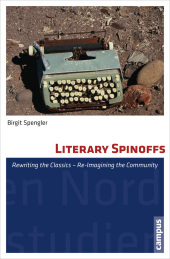 Neuerscheinungen 2016Stand: 2020-02-01 |
Schnellsuche
ISBN/Stichwort/Autor
|
Herderstraße 10
10625 Berlin
Tel.: 030 315 714 16
Fax 030 315 714 14
info@buchspektrum.de |

Birgit Spengler
Literary Spinoffs
Rewriting the Classics - Re-Imagining the Community. Habilitationsschrift
2016. 500 p. w. 18 ill. 211 mm
Verlag/Jahr: CAMPUS VERLAG 2016
ISBN: 3-593-50311-5 (3593503115)
Neue ISBN: 978-3-593-50311-0 (9783593503110)
Preis und Lieferzeit: Bitte klicken
Birgit Spengler untersucht in ihrer Arbeit das zeitgenössische Genre der "Spinoffs" - Romane, die klassische kanonische Werke der amerikanischen Literatur kreativ um- und fortschreiben. Am Beispiel der schreibenden Auseinandersetzung mit Klassikern wie "Moby-
Dick" oder den "Adventures of Huckleberry Finn" entschlüsselt sie die literarischen Strategien, die "Spinoffs" nutzen, um auf gesamtkulturelle Sinnstiftungsprozesse Einfluss zu nehmen und sich in die kulturelle Imagination einzuschreiben. Dabei stellen diese Romane auch die Frage nach der Abgeschlossenheit von Kunstwerken, nach kulturellem Kapital und geistigem Eigentum neu.
Contents
Acknowledgements 9
Introduction 11
1. Literary Spinoffs: An Intertextual Genre 30
1.1.Spinoff Aesthetics: Explicitness and Intensity of the Intertextual Relation 32
1.2Oscillation and Good Continuation 36
1.30-2: Text and Context/Text and Matrixes 41
1.4The "Dialogic" Involvement with the Pre-Text:
Dark Areas and In-/Compatibility of Fictional Worlds 44
1.5Spinoffs as Communicative Genre: Dialogue and Dialogics 48
1.6Intertextual Contexts 50
2.Re-Visioning Intertextuality: Models and Debates 61
2.1Predecessors: Poststructuralist vs. Descriptive Intertextuality 62
2.2Alternative Positions 73
2.3A Working Model of Intertextuality in Cultural and Literary Analysis 78
3.Cultural Work and the Functions of Genre 97
3.1Cultural Work 99
3.2Exclusion and Inclusion: Spinoffs and/as Participatory Culture 102
3.3The Literary Marketplace and Cultural Capital 107
3.4Copyrights and Copywrongs: Who "Owns" Culture? 111
3.5Revisiting the Nineteenth Century 116
4.Ahab´s Wife: A Cannibal of a Book? 125
Ow(n)ing Melville 125
4.1Appropriating Melville 131
Swimming through Libraries, Weaving the Web: Levels and Methods of Intertextual Engagement in Ahab´s Wife 134
Whose Melville? 142
4.2The World as Ship: Mad Hunts, Male Myths 150
Melville´s Male Microcosm 150
Moby-Dick as Quest Narrative: Ahab´s Quest156
Male Quests Reconsidered164
Re-Considering the World of Male Bonding175
4.3Re-Writing the Quest: From Soaring Spirit to Social Vision 180
Invading the World of the Ship, Questioning Separate Spheres182
Diving and Soaring187
Una´s (In-)Sights: Freedom and Community196
Reading Melville through Discourses of Slavery203
(Mis-)Guided Missions-Commenting on National Quests 208
4.4The Quill and the Quilt: Art as Social Vision 211
The Quilt and the Quill: Sewing and Writing as Means of Coping 212
The Life of Art: Creating a Community of Texts222
5.From Playing Pilgrim to Waging War: March 229
The Return of the Father229
5.1Little Women: Alcott´s Classic? 233
"Moral Pap for the Young" vs. Female Myth 233
Little Women´s Intertexts 237
5.2Little Women and Colossal Fathers: March´s Pre-Texts 245
Re-Writing Little Women 245
Literary Intertexts 248
History and Biography as Intertexts 253
5.3March´s Civil Wars: Gender, Soul-Wrestling, Slavery, and Innocence 259
The Missing Father as Husband: Sex Wars 261
The Father as Pilgrim: A Transcendentalist´s Civil "Wars"270
Re-Viewing the National Founding Story, Re-Imagining the Civil War278
The End of Innocence: March´s National Bequests288
A Trunk Full of Books300
6.American Pastorals? Re-Reading Adventures of Huckleberry Finn 304
6.1Twain´s Fame: The Hypercanonization of Mark Twain
and Huckleberry Finn 304
6.2Reading Huckleberry Finn: Hermeneutic Agendas 311
Hannibal Nostalgia: Imagined Childhoods and Pasts314
The Mississippi as Alternative Space: Freedom and Civilization 322
Race in Huckleberry Finn: Voice, Plot, and Characterization 328
6.3My Jim: Huckleberry Finn as Neo-Slave Narrative 338
In the Margins of Twain´s World: Turning Huckleberry Finn into a Narrative of Slavery 340
Re-Dressing Jim: From Minstrel Mask to White Man´s Hat 359
Mississippi Myths 367
Connections372
6.4The Bequests of the Fathers: Fatherhood, Inheritances, and the Role of the Past in Finn 385
Rewriting Pap Finn: Intertextual Strategies in Finn 389
Fatherly Bequests and River Nightmares: Finn and the Nature/Civilization Divide 394
Huck´s Blackness405
Whence, America? National Origins and Narrative Voice 410
The Writings on the Whitewashed Wall 415
In Search of Narrative Alternatives 421
Conclusion: Story-Telling, Libraries, Trunks of Books, and the Writing on the Whitewashed Wall 429
Bibliography 452
List of Illustrations 492
Index494


